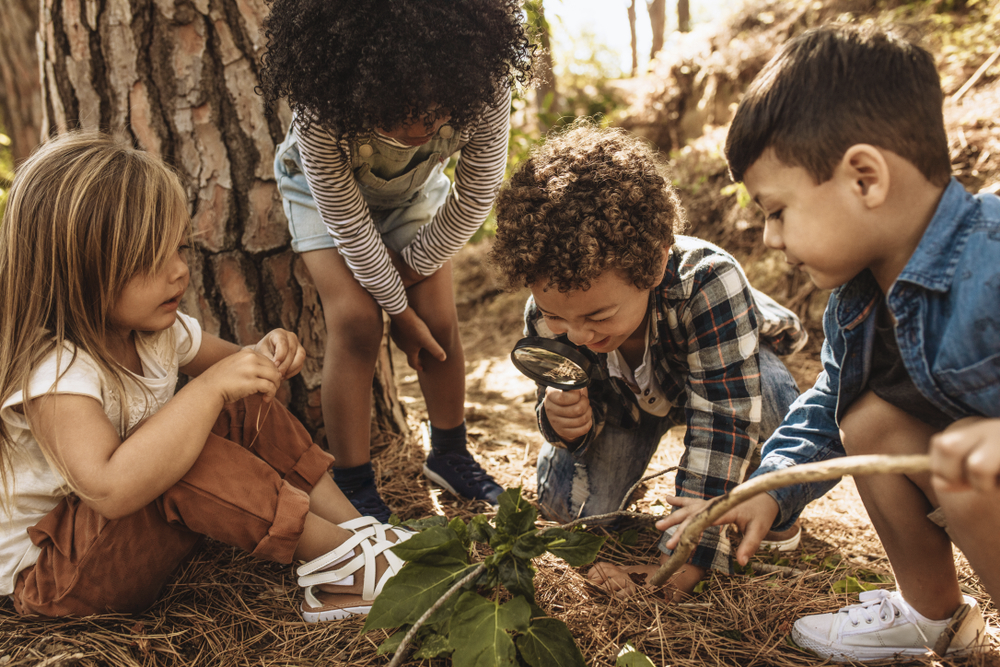Though it seems, well, natural, kids aren’t born with an inherent appreciation or respect for nature. Our society is largely built around life indoors, especially those of us who live in seasonal climates, and spending time inside is a necessity much of the time. These truths mean teaching kids to enjoy and understand nature must be a conscious effort, one that should be fostered through every stage of childhood. But how do you get kids to appreciate nature if they don’t have much experience with it? Here are a few of our favorite ideas.

- Break Out the Camera — Before you hit the trail or go wildlife spotting, pack the camera backpack and plan to teach your little ones a bit about nature photography. You don’t have to be an expert — or even experienced with photography at all — to effectively introduce your kids to this hobby. It’s great because it combines creativity, art and science together in a unique way. Nature photography also helps kids appreciate nature in a deeper way by inviting them to look at it from new angles and then study it in photos at home.
- Take Them Somewhere Remarkable — Every corner of the Earth has something remarkable, even your own backyard, but we all remember the first time we saw a breathtaking natural landscape. From the Grand Canyon to Monument Valley to the redwoods and towering waterfalls, there’s most likely an incredible natural wonder within driving distance. A day trip to see a unique natural feature can seriously expand their worldview and broaden the way they think about nature.
- Visit the Local Nature Center — These centers exist for a reason, and that’s to help people better appreciate nature. They almost always have special events, guided hikes and activities just for kids, and they can be an incredible resource for parents who themselves are not especially outdoorsy. Wikipedia even has a list of nature centers by state that will help you find one nearby.
- Talk to Them About Global Warming — If your youngsters know that the nature around them is in jeopardy, they may be more interested in spending time outside or helping to lower their environmental impact. Talking to kids about global warming can be scary and complicated, though. The Natural Resources Defense Council (NRDC) has a great guide regarding how to talk to kids about climate change.
- Use Plant ID Apps — Technology is both the enemy and the ally of the nature-loving parent! In this case, it can be used for good to help kids understand some crucial concepts about the immediate world around them. One of the most fun ways to get kids to appreciate local flora and fauna is by using one of the many plant ID apps available. These apps tell you exactly what kind of tree, flower, weed or shrub you’re viewing, all with a simple snap of a pic.

- Start your nature studies at the zoo, aquarium or animal rescue. One specific method for helping kids appreciate Mother Nature is introducing them to some of the world’s most incredible and awe-inspiring species, such as whales, lions and condors.
- Send Them to Summer Camp — Camp can help kids get up close and personal with nature in a way that’s structured yet fun. On top of that, camp introduces them to other kids who can help make exploring nature a bit more exciting. Overnight summer camps are a great option, but there are many nature-themed day camps, including some run by parks systems, that are surprisingly affordable.
- Go Camping — This is the original method for getting city kids to understand and appreciate nature, and it still works like a charm. Do everything you can to make the experience fun, with classic camp activities like marshmallow roasting and tossing the frisbee. Be sure to stock your cooler backpack with some water and snacks and head out for a hike or a little fishing.
- Enroll Them in Scouting — Scouting organizations exist to teach fundamental values and principles to youngsters, with a strong focus on the outdoors. Whether it be the Boy Scouts, the Girl Scouts or a local alternative, these organizations provide kids with the resources and activities they need to learn key skills associated with the wilderness. Camping, swimming and hiking are all focuses, but they also tend to emphasize things like leadership and volunteerism.
- Play Games Outside — Kids are a lot more likely to appreciate something with which they have formed positive feelings. Getting outside and playing simple games, whether it be catch or fun lawn games, can help get them acquainted with the outdoors in an enjoyable way. The occasional mosquito bite or bee sting is inevitable, which will help kids ease their fears and discomforts surrounding the outdoors. Fresh air is always a good thing for kids, especially when you’re also emphasizing the importance of physical fitness and respect for nature.
- Go Stargazing — Older kids will be really excited to get to go outside after dark, so this one’s an automatic win! Break out the telescope and use your stargazing app to see which planets, stars and constellations you can spot. If you don’t have a telescope, consider getting in touch with your local astronomy club and going to a meeting. They typically set up high-quality telescopes in public parks or near observatories to share their hobby with the public. Note that some public libraries may also let you rent or borrow a telescope.
